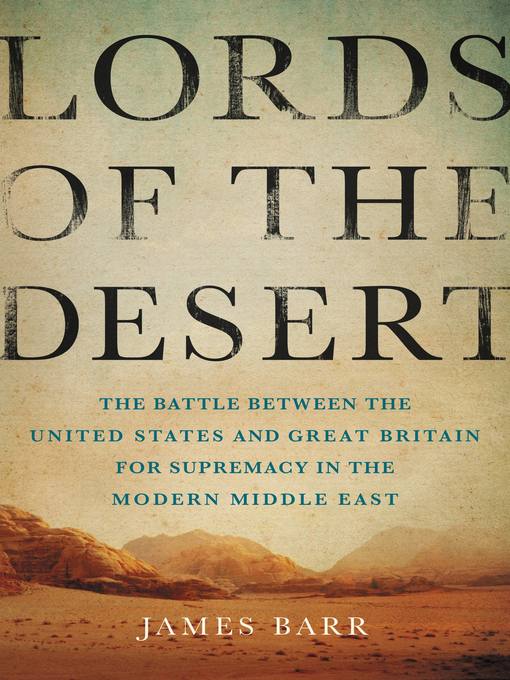
Lords of the Desert
The Battle Between the United States and Great Britain for Supremacy in the Modern Middle East
کتاب های مرتبط
- اطلاعات
- نقد و بررسی
- دیدگاه کاربران
نقد و بررسی

July 15, 2018
Historical account of the long rivalry between Britain and the United States over hegemony in the Middle East.If you're wondering why things are so intractably turbulent in places like Syria and Iraq, some suggestive answers emerge from Barr's (A Line in the Sand: The Anglo-French Struggle for the Middle East, 1914-1948, 2012, etc.) book, which looks at Whitehall and the White House instead of Jedda and Jerusalem. Britain's ambitions in the region were largely strategic, meant to protect approaches to India. American interest in the Middle East, however, was largely commercial, hinging on which outside power would control the oil resources of the region. As such, Barr adds, the Americans were "more realistic and flexible" about local political conditions, while the British understandably expected the Americans to retreat into isolationism, as they had after World War I, after having extracted all due gratitude from their British allies. (In an entertaining anecdote, the author recounts Winston Churchill's willingness to kiss Uncle Sam on both cheeks, "but not on all four.") Instead, America interfered with British operations in such famous instances as the seizure of the Suez Canal, since the U.S. was trying to keep Egypt on the side of the West in the growing Cold War. Enoch Powell concluded that America was Britain's greatest enemy in the Middle East even as the Eisenhower administration made great efforts to insinuate American supremacy. A revelation: A decade later, the rivalry still fuming, Lyndon Johnson attempted to link American aid to Britain to fend off a crisis in the value of the pound to Britain's sending troops to Vietnam. Said one British diplomat, sniffily but with cause, the U.S. had been trying to keep Britain out of Asia but now wanted it in, because "it did not want to be the only country killing coloured people on their own soil."A book of considerable interest to students of geopolitics, one that explains much about America's relations with the Arab world--and with Britain.
COPYRIGHT(2018) Kirkus Reviews, ALL RIGHTS RESERVED.

September 15, 2018
After World War I, the United States reverted to staying out of the world's affairs (for the most part) and Britain resumed its leadership role. But after World War II, the United States took a different tack with its international responsibilities and was no longer willing to defer to the British. Barr (visiting fellow, King's Coll., London; A Line in the Sand) has crafted another exceptional historical study, this time focused on the sometimes tense relations between Britain and its erstwhile ally as both countries vied for power in the Middle East during the years between the end of World War II and the start of the Six Day War in 1967. Barr's fine work nicely complements another recent history, Derek Leebaert's Grand Improvisation: America Confronts the British Superpower, 1945-1957. The common belief that Britain and America got along during those tempestuous postwar years deserves a reexamination, and Barr and Leebaert both provide it. VERDICT A fine history by a master historian that provides a needed reassessment of Anglo-American relations after World War II. Recommended for all collections.--Ed Goedeken, Iowa State Univ. Lib., Ames
Copyright 2018 Library Journal, LLC Used with permission.

























دیدگاه کاربران